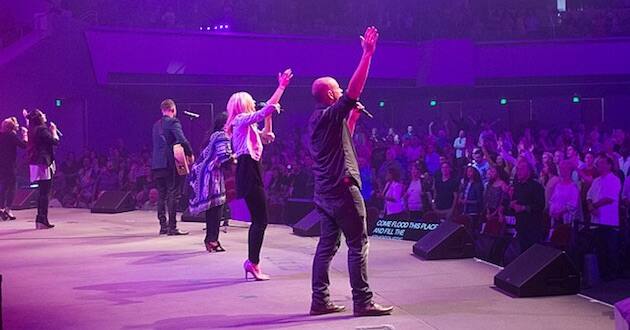Most popular worship songs traced back to just four megachurches

A handful of megachurches have cornered the market on worship music in recent years, churning out hit after hit and dominating the worship charts, a new study reported by Religion News Service found.
The study looked at 38 songs that made the Top 25 lists for CCLI and PraiseCharts, which track what songs are played in churches, and found that almost all had originated from one of four megachurches — Bethel; Hillsong, a megachurch based in Australia; Passion City Church in Atlanta, which runs a popular youth conference that fills stadiums; and Elevation, a North Carolina congregation.
“If you have ever felt like most worship music sounds the same,” the study’s authors wrote, “it may be because the worship music you are most likely to hear in many churches is written by just a handful of songwriters from a handful of churches.”
Elias Dummer, a worship leader and recording artist, said he and his colleagues have been watching changes in worship music over the past decade. They wanted to know how worship songs become popular among churches, he said. They also wanted to know how the business of producing and marketing songs is shaping the worship life of local churches.
Dummer said many worship leaders believe the best songs become the most popular in churches. They also believe those songs become popular because they work — people respond to them during worship services and want to sing them over and over. But that’s not exactly true. Dummer and his colleagues found many of the more recent hits songs were released as singles on Spotify and other streaming services, which helps fuel their popularity.
Worship leaders found new songs by:
- Friends and social media (54%)
- Church attendees (56%)
- Church leaders (77%)
- Streaming online (70%)
- Hearing at an event (76%)
“There are actual mechanisms by which songs become the most significant,” he said. “It’s not just whatever songs the Holy Spirit blesses that make it to the top of the charts.”
Of the 38 songs in the study, 22 initially were released by the four megachurches, with another eight songs released by artists affiliated with those churches. Six more were either collaborations.
Adam Perez, assistant professor of worship studies at Belmont University in Nashville, said the four most influential megachurches all come from the charismatic tradition of Protestant churches. All of them, he said, have a spirituality that believes God becomes present in a “meaningful and powerful way” when the congregation sings a particular style of worship song.
Those songs become one of the primary ways of connecting with God, rather than prayer or sacraments or other rituals. Because of their market success, these churches have changed the spiritual practices and sometimes even the theology of congregations from many traditions.
“The industry itself becomes this invisible hand,” he said. “We don’t name the theology of praise and worship, we just assume it. And we use this kind of song repertoire to reinforce it.”
–Alan Goforth | Metro Voice








